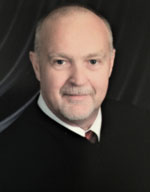25 graduates and counting in three years . . .
Corporal Kyle Reynolds was arrested five times in the first three years after returning from active duty in Afghanistan. The U.S. Marine Corps gunsmith was charged with disorderly conduct and felony assault on a police officer. He was staring down prison time.
“I drank all the time,” says the now 30-year-old. “But it caught up with me real fast when I got out of the Marines. I got divorced and wasn’t coping with my feelings well. I was letting rage come out without control. If I hadn’t found Veterans Court, I’d be drunk or in jail.”
Reynolds is one of 25 veterans to graduate from Hamilton County’s Veterans Court in the last three years – more than half of them in the past six months. Superior Court Three Judge William Hughes launched Veterans Court in 2016 after noticing an uptick in substance abuse and crime among the county’s former military personnel.

Hughes
“There is a culture in the military that you work hard, and you play very hard,” Judge Hughes explains. “Because of where the military serves, often that’s in a restricted area, and unfortunately drugs and alcohol are almost always there.”
The National Institute on Drug Abuse says more than one in 10 veterans have been diagnosed with a substance use disorder, slightly higher than the general population. And to further complicate the matter, “they face an array of challenges – unpredictable deployments, the risk of injury, and being away from home.” Veterans are also at risk of being diagnosed with a co-occurring disorder – such as substance abuse and PTSD.
“Where these folks are coming from and their journey in life is different than you and me,” Judge Hughes explains. “If we’re going to respond and make sure they have the best possibility of not reoffending we have to understand those differences.”
Reynolds’ substance abuse escalated after a near-fatal car accident upon his return from Afghanistan. A traumatic brain injury caused him grave anxiety and partial blindness. Veterans Court helped put him in touch with the Department of Defense and Veterans Administration. Oftentimes, veterans like Reynolds are unaware of the services that are available to them after leaving the military. Reynolds has been sober for six years and is living on a disability pension he earned through his service.
“Veterans Court was a bear,” Reynolds recalls. “I had a hard time adapting. I would argue everything they wanted me to do, but the team never gave up on me.”
Reynolds is now a proud homeowner and volunteers as a counselor at his church’s youth group.
“Veterans Court gave me something that I hadn’t had since the Marines; structure and accountability,” said Reynolds. “I felt I had a purpose when I was in the military. I was missing that when I got home.”
Judge Hughes agrees: “This program works because there is a very distinct chain of command, just like in the military.”
Veterans Court provides access to a continuum of medical, mental, alcohol and drug treatment, and rehabilitation services. Participants are required to follow and successfully complete an evidence-based treatment plan as well as attend regular court appearances. Abstinence from alcohol and other drugs is monitored by frequent testing. The entire process can take up to three years to complete.
Judge Hughes sums it up nicely: “We have a moral obligation to give back to the people who stood in the breach for us. We’re talking about people who put their lives on the line to protect the freedoms that we all enjoy and what we do in the courts to support.”
